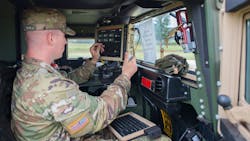Army researchers ask industry for new approaches in information security for trusted tactical networks
ABERDEEN PROVING GROUND, Md. – U.S. Army researchers are asking industry for new ways of ensuring trusted information so as not to contaminate tactical networks and automated decision making.
Officials of the Army Contracting Command at Aberdeen Proving Ground, Md., issued a broad agency announcement Friday (BAA-18-R-STCD) a project to ensure information trust.
The Army Contracting command is releasing this announcement on behalf of the Space and Terrestrial Communications Directorate (S&TCD) of the Army's Command, Control, Computers, Communications, Cyber, Intelligence, Surveillance and Reconnaissance Center (C5ISR) Center at Aberdeen Proving Ground.
In today’s world of information security, Army commanders must be able to trust data on which they make decisions; they make decisions today with the assumption that all data is trustworthy, researchers say.
Yet current industrywide cyber protection techniques do not prevent data from being compromised prior to the digital signature or encryption processes.
Since real-time assurance of data integrity and provenance is unavailable, identifying what information has been maliciously modified can take months of forensic analysis. By the time it is determined, often remedial actions are too late.
Army researchers are looking for a sophisticated solution to ensure data created within networks, traversing the networks, and brought into a network remains trusted, and unmodified through unauthorized or accidental means.
For now, Army researchers want white papers from companies that not only have expertise in developing software, but also with a background in blockchain, machine learning, and artificial intelligence in military tactical networks.
Of particular interest are technologies to:
- enable soldiers to make critical, real-time battle decisions based on trust-validated information;
- minimize the risks that autonomous systems could be contaminated by untrustworthy, dirty, or poisoned data;
- provide cyber electromagnetic activities personnel with additional information about cyber attacks;
- minimize network bandwidth requirements of providing trusted information; and
- maintain broad access to tactical networks and improve understanding of who is using these networks, and of questionable actions.
Proposed solutions should be at least as mature as proof-of-concept (TRL 3), but not more mature than a system prototype (TRL 6). Ultimately the Army wants a prototype for testing in Army tactical information technology environments, and then switched into Army programs of record. The goal is developing an integrated information trust service for use in the tactical environment.
The Army may award initial one-year contracts to as many as four companies. Total funding may be as much as $9.5 million.
Companies interested should email 10-page white papers no later than 19 Dec. 2019 to the Army's Wendy Choi at [email protected], with copies to Brian Holman at [email protected], Andrew Pilone at [email protected], and to the project mailbox at [email protected].
Email questions or concerns to Wendy Choi at [email protected]. More information is online at https://beta.sam.gov/opp/9616214c40d84e528f5d4bffed5a8226/view.
